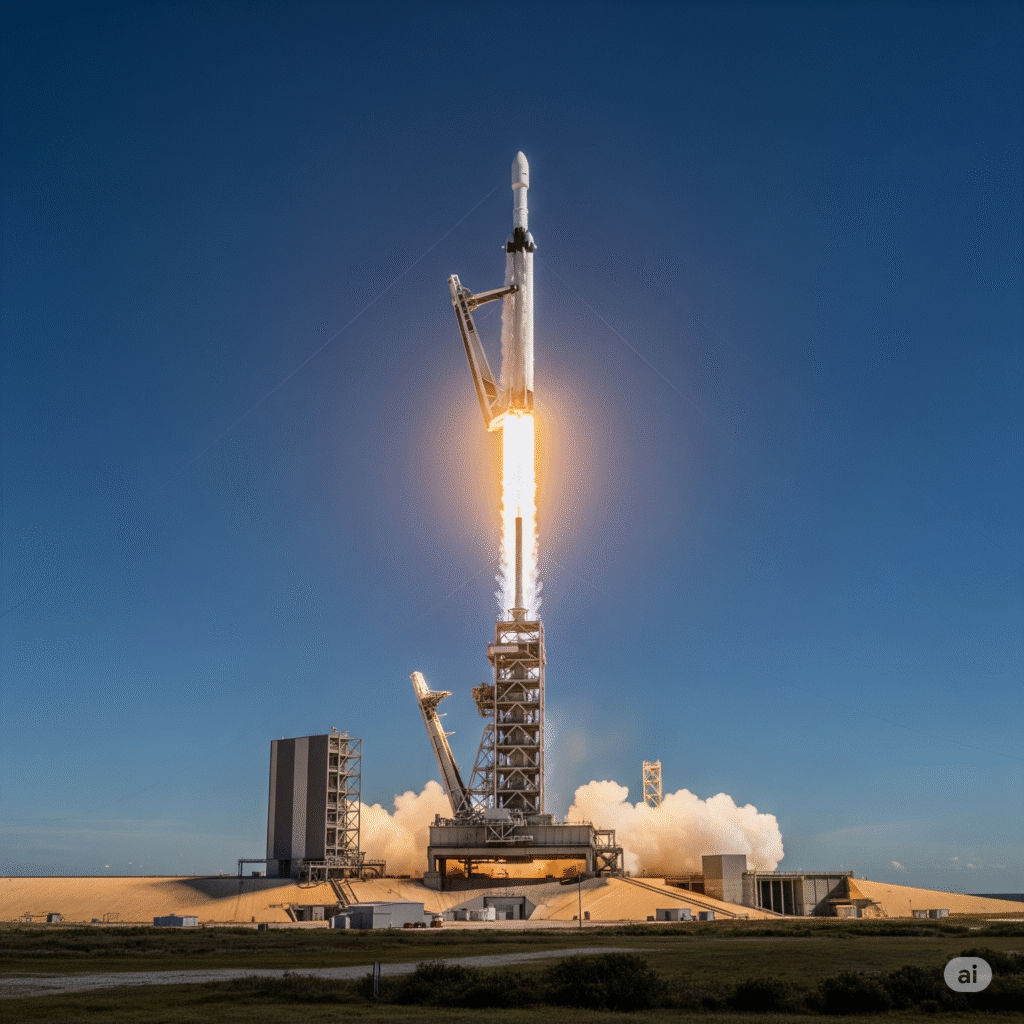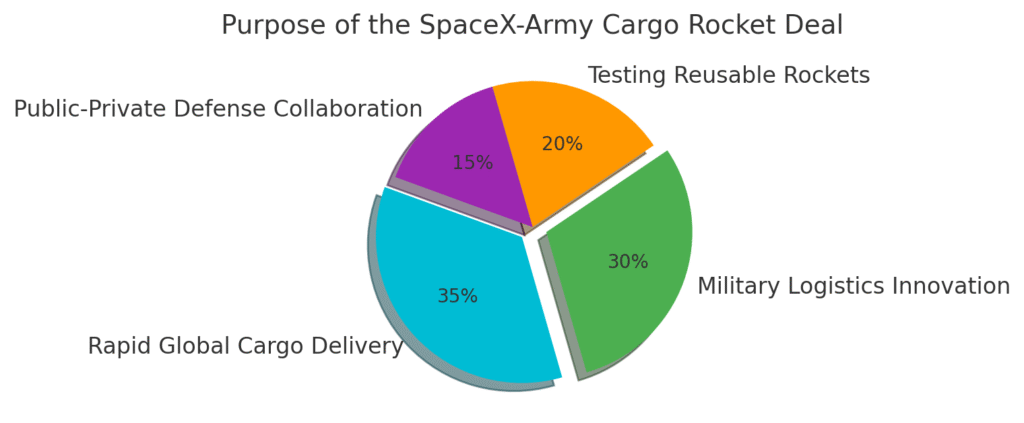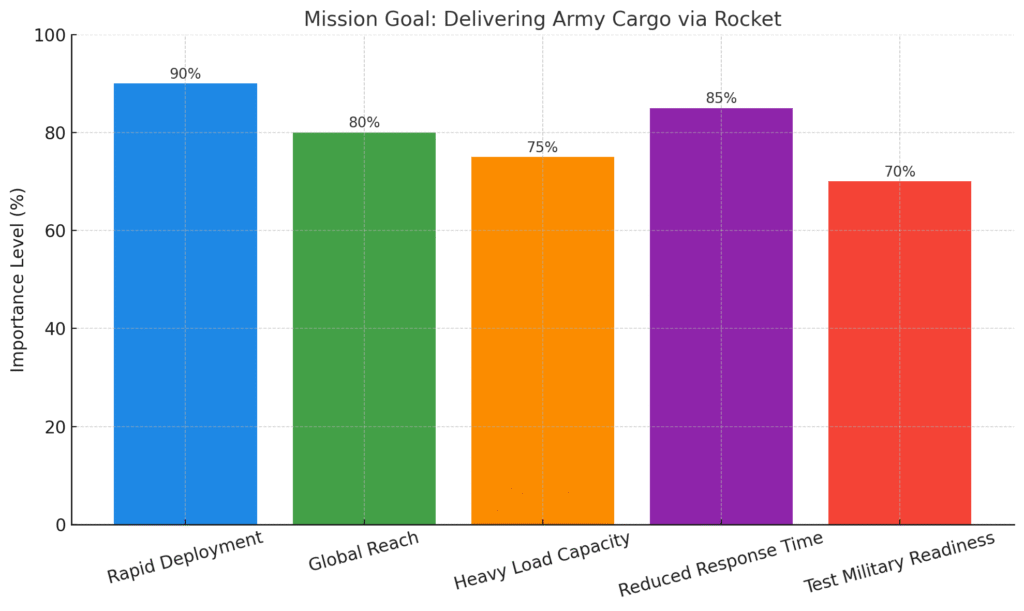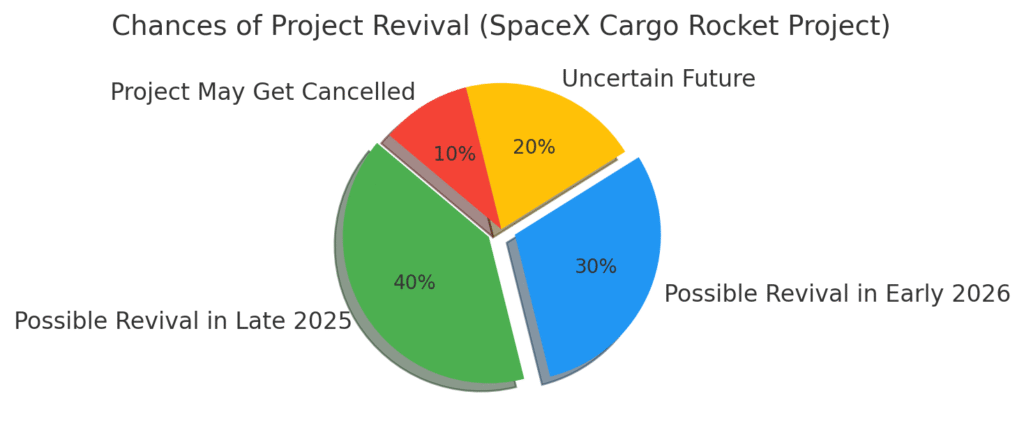
Why did the Army pause SpaceX’s rocket plan? Elon Musk’s viral ‘no omelette’ joke sparks debate in 2025. Full story, facts & future explained.
What Was the SpaceX-Army Cargo Rocket Deal All About?

This project was a joint plan between SpaceX and the U.S. Army to use rockets like Falcon 9 and Starship for delivering military cargo across the world in just hours. The goal was to replace slow transport ships and planes with high-speed rocket logistics.
Testing was planned at Johnston Atoll, a remote Pacific island chosen for its isolation and safety. But soon after, the project was paused due to growing concerns — both environmental and strategic.
Mission Goal: Delivering Army Cargo via Rocket

The main goal of the project was to explore whether rockets could be used for rapid military cargo delivery. Instead of relying on slow cargo ships or transport planes, the U.S. Army wanted to test if SpaceX rockets could carry supplies like food, gear, or medical kits to any location on Earth — in just a few hours.
This concept, called Rocket Cargo, aimed to make military logistics faster, more flexible, and less dependent on overseas bases. It was a futuristic vision where rockets could land supplies in remote or high-risk areas instantly, helping troops on the ground when they need it most.
Why Johnston Atoll Was Chosen for Testing
Johnston Atoll was selected as the test site because of its remote location in the Pacific Ocean. With no permanent civilian population and a long history of military use, it provided an ideal setting for high-risk rocket experiments.
The isolated geography meant that even if something went wrong during testing, the risk to human life or infrastructure was minimal. Plus, the wide open space around the island made it perfect for landing or recovering large rockets.
However, despite its strategic benefits, the location raised environmental red flags — especially from scientists who warned about its impact on rare seabird nesting grounds. This became one of the key reasons behind the project’s sudden pause.
main web site spaceXs.com
Technology Involved: Falcon 9 or Starship?
The project planned to use SpaceX’s Falcon 9 rocket in the early phases because it’s already flight-proven, reusable, and reliable. Falcon 9 has completed hundreds of successful launches, making it a strong choice for testing the rocket cargo concept.
But in the long term, the U.S. Army and SpaceX were also eyeing Starship, SpaceX’s next-generation rocket. With its massive payload capacity and full reusability, Starship could carry much heavier equipment — even full military vehicles or mobile command units.
So, while Falcon 9 was the practical choice for early missions, Starship was seen as the real game-changer for the future of global military logistics.
Why Did the U.S. Army Suddenly Pause the Project
Despite the excitement around the SpaceX-Army cargo mission, the U.S. military decided to pause the project in mid-2025 due to rising concerns — especially around environmental impact and strategic security.
The biggest issue came from Johnston Atoll’s fragile ecosystem, where environmental groups warned that rocket launches could disturb rare seabird nesting grounds. This led to pushback from wildlife experts and public pressure on the military.
At the same time, internal questions were raised about whether it was safe or wise to rely on a private space company for sensitive military operations. As a result, the Army chose to hit the brakes and re-evaluate the plan before moving forward.
Environmental Objection: Seabirds vs Rockets
One of the biggest reasons behind the project pause was the environmental impact at Johnston Atoll. This remote island is not just an empty testing zone — it’s also a protected nesting site for several rare seabird species.
Wildlife experts warned that frequent rocket launches could disturb these birds during critical breeding seasons. The loud noise, heat, and vibrations from rocket landings posed a serious threat to eggs and hatchlings.
Environmental groups raised alarms, and the issue quickly gained public attention. With rising pressure and concerns about violating conservation laws, the Army decided to step back and pause the mission to avoid long-term ecological damage.
Safety & Strategic Concerns from the Army
Apart from environmental issues, the U.S. Army also had serious concerns about safety and long-term strategic risks. Rocket-based cargo delivery is still a new and untested concept for military use, and even a small error could lead to massive loss of equipment — or worse, lives.
There were also questions about how much control the military would actually have over operations handled by a private company like SpaceX. In sensitive defense missions, security, precision, and trust are critical — and handing over logistics to an outside player raised red flags inside the defense community.
So, to avoid rushing into a risky setup, the Army chose to pause and re-assess whether this bold approach was truly practical and secure in the long run.
FAA’s Role in Putting the Brakes On
The Federal Aviation Administration (FAA) also played a key role in the decision to pause the project. Since rocket launches involve strict safety, airspace, and environmental regulations, the FAA must approve every test — especially on sensitive sites like Johnston Atoll.
As concerns grew about the impact on local wildlife and public safety, the FAA withheld full clearance for the upcoming test. They began a deeper environmental and risk assessment, which further delayed the timeline.
Until the FAA completes its review and gives the green light, Spacx and the Army cannot legally move forward with testing at the site. This regulatory pause added another layer of uncertainty to the already controversial mission.
Elon Musk’s ‘No Omelette’ Joke Goes Viral
When the cargo rocket project was suddenly paused, people were expecting a serious response from Elon Musk. But instead, he surprised everyone with a sarcastic and meme-worthy comment:
“I will not eat an omelette for a week.”
At first glance, it sounded like just another Musk joke. But there was actually a hidden meaning. The test site, Johnston Atoll, was facing criticism because it’s a nesting ground for rare seabirds — meaning, lots of eggs around. Musk’s comment was a tongue-in-cheek way of mocking the situation:
“No rocket tests because of bird eggs? Fine, no eggs for me either.”
The line quickly went viral on Twitter (X) and Reddit. Supporters found it hilarious and classic Musk-style humor, while critics saw it as insensitive to environmental concerns.
Either way, his short comment added fuel to the debate — and kept the paused project in global headlines.
What Did Elon Musk Really Mean by This?
At first, Musk’s omelette comment seemed like a random joke. But for those following the controversy, it was clearly a sarcastic jab at the environmental pushback that caused the rocket tests to be paused.
The rocket site was under fire for being located in a protected bird nesting area, where rare seabirds lay eggs. Environmental groups warned that rocket activity could disturb those fragile nests.
Musk’s “no omelette” line was a symbolic way of saying:
“If we can’t test rockets because of bird eggs, then I won’t eat eggs either.”
It was part frustration, part humor — and fully Musk. His statement didn’t just make headlines; it added a personal, almost rebellious twist to an already heated issue.
Connection Between Omelette and Rocket Testing Ban
Elon Musk’s “no omelette” comment wasn’t just a random joke — it was directly linked to the reason behind the rocket test ban. The testing site, Johnston Atoll, is home to several endangered seabird species that lay eggs during nesting season.
Environmental groups raised alarms, saying rocket landings could disrupt these birds and destroy their eggs. That concern played a major role in pushing regulators and the military to pause the cargo rocket project.
So, Musk’s omelette line was a sarcastic reference to the situation:
“If eggs are the issue, I won’t eat them either.”
It turned a serious environmental debate into a viral moment — mixing humor with frustration.
Social Media Reactions to Musk’s Statement
Musk’s “no omelette” comment quickly went viral on platforms like Twitter (X) and Reddit. While many fans found it funny and typical of his humor, others criticized it as being insensitive toward real environmental concerns.
Memes, jokes, and debates flooded social media, turning a serious issue into an internet moment. Whether people loved it or hated it, the comment kept the rocket testing pause in the public eye.
What Happens to the Project Now? Is It Cancelled Forever?
Despite the current pause, the SpaceX-Army rocket cargo project is not officially cancelled. The U.S. Army has clarified that this is a temporary suspension, allowing time to review environmental risks, safety protocols, and regulatory approvals from the FAA.
SpaceX has not backed away from the mission. The company continues to push the idea that reusable rockets can revolutionize military logistics — making it possible to deliver urgent supplies anywhere on Earth in just hours. Executives at SpaceX have even hinted that upcoming Starship variants could be tailored specifically for heavy cargo transport.
So while timelines are uncertain, the project is still very much alive. Its future now depends on updated launch plans, environmental studies, and how the U.S. military chooses to move forward with SpaceX as a private partner.
Official Statement from the U.S. Air Force
In an official note, the U.S. Air Force confirmed that the SpaceX cargo rocket project has been placed on hold. They stated that the pause was made to “reassess environmental and strategic factors” and emphasized that the program is under review — not cancelled.
Will SpaceX Find a New Testing Location?
SpaceX may look for a new site if Johnston Atoll remains blocked. With facilities like Starbase (Texas) and Cape Canaveral, the company has other testing options that could avoid environmental hurdles and speed up future cargo rocket trials.
Chances of Project Revival in Late 2025 or 2026

There’s a strong chance the cargo rocket project could return by late 2025 or early 2026. If SpaceX can address environmental concerns and the U.S. Air Force finds a suitable location, testing might resume with updated guidelines.
The company’s long-term vision and the military’s interest in rapid logistics make a full cancellation unlikely.
